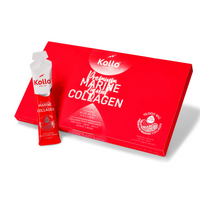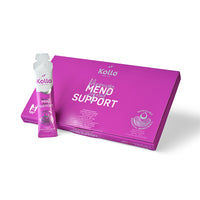Collagen and Warfarin: What You Need to Know Before Supplementing

Introduction – Understanding the Collagen and Warfarin Connection
If you're taking warfarin and considering adding collagen supplements to your routine, you're right to do your research first. The relationship between these two substances requires careful consideration to ensure your health and safety.
Why People Take Collagen Supplements
Collagen has become one of the most popular supplements on the market, and for good reason. As the most abundant protein in our bodies, collagen provides structural support to our skin, joints, tendons, bones, and blood vessels. By our mid-20s, our natural collagen production begins to decline, which is why many people turn to supplements like marine collagen to help maintain:
-
Skin elasticity and hydration
-
Joint health and mobility
-
Hair strength and volume
-
Nail integrity
-
Gut health
The potential benefits are compelling, but when you're on prescription medication like warfarin, additional considerations come into play.
What is Warfarin and How Does It Work?
Warfarin (commonly sold under brand names like Coumadin) is an anticoagulant medication that helps prevent blood clots from forming or growing larger. It works by interfering with vitamin K's role in the blood clotting process. Specifically, warfarin inhibits vitamin K-dependent clotting factors, which slows down your body's ability to form clots.
This medication is commonly prescribed to people with:
-
Atrial fibrillation
-
Deep vein thrombosis (DVT)
-
Pulmonary embolism
-
Artificial heart valves
-
History of heart attack or stroke
Due to its narrow therapeutic window, warfarin requires careful monitoring and dose adjustments to maintain effectiveness while preventing bleeding complications.
Can Collagen Interact with Warfarin?
This is the crucial question for anyone on warfarin therapy considering collagen supplementation. The potential for interaction stems from collagen's relationship with various clotting mechanisms in the body. While collagen itself isn't a direct vitamin K source (like leafy greens), it does play a role in the body's hemostatic (blood-clotting) processes.
How Collagen May Affect Warfarin Users

Collagen supplements are widely used for their potential benefits in promoting skin elasticity, joint health, and hair strength. However, for individuals taking Warfarin, a blood thinner, there is concern about how collagen might interact with the medication. Warfarin works by preventing blood clots, and since collagen plays a role in wound healing and tissue repair, some speculate that it could influence blood clotting mechanisms. While collagen itself is not known to have direct anticoagulant properties, certain formulations or additional ingredients in collagen supplements—such as vitamin K or other factors—could interfere with Warfarin’s effectiveness.
The Role of Collagen in the Body
Collagen is more than just a beauty supplement. In the context of blood function, collagen has several important roles:
-
Blood vessel integrity: Collagen helps form the structure of blood vessel walls
-
Platelet activation: When blood vessels are damaged, exposed collagen fibers can activate platelets, which are crucial for clot formation
-
Hemostasis support: Collagen provides a scaffold during the clotting process
These functions highlight why there's a theoretical concern about combining collagen with blood-thinning medications.
How Warfarin Affects Blood Clotting
Warfarin works by inhibiting an enzyme called vitamin K epoxide reductase, which is necessary for activating several clotting factors (II, VII, IX, and X). By interfering with this process, warfarin extends the time it takes for your blood to clot.
The effectiveness of warfarin is measured through the International Normalized Ratio (INR) test, which indicates how quickly your blood clots compared to normal. Most warfarin patients aim to maintain an INR between 2.0-3.0, though target ranges vary based on individual health conditions.
Scientific Research on Collagen and Warfarin Interaction
Currently, there is limited scientific research directly examining the interaction between collagen supplementation and Warfarin. Most concerns stem from the fact that collagen is a protein that supports blood vessel integrity, which could theoretically impact coagulation pathways. However, no major studies have conclusively shown that collagen alters INR (International Normalized Ratio) levels, which measure blood clotting time in Warfarin users. Given this lack of definitive evidence, healthcare providers typically recommend caution and close monitoring for those who wish to take collagen while on anticoagulant therapy.
Does Collagen Increase or Decrease Blood Clotting?
The research presents a somewhat complicated picture. At the biochemical level, collagen is known to be involved in the early stages of blood clotting. When blood vessels are damaged, collagen fibers become exposed and provide binding sites for platelets, initiating the clotting cascade.
However, the collagen in supplements is broken down into smaller peptides during digestion, and these peptides are metabolized differently than the intact collagen in your body. This raises questions about whether supplemental collagen actually affects clotting in the same way as the body's natural collagen.
Studies on Collagen and Blood Thinners – What the Science Says
Direct research on collagen supplementation and warfarin interaction is limited. Most clinical studies involving collagen supplements exclude participants taking anticoagulants, creating a knowledge gap.
However, a few relevant findings from the available research:
-
A 2019 review in the Journal of Cosmetic Dermatology found no reports of collagen peptide supplements directly interfering with anticoagulant medications
-
Some animal studies suggest that certain collagen peptides might affect platelet aggregation, but these findings haven't been conclusively demonstrated in humans
-
Research on marine collagen 10000mg specifically shows potential anti-inflammatory effects, which could theoretically impact coagulation pathways
Expert Opinions on Combining Collagen with Warfarin
Medical professionals tend to take a cautious approach when it comes to mixing supplements with prescription medications. Hematologists and cardiologists generally recommend:
-
Consulting with your healthcare provider before starting any supplement while on warfarin
-
More frequent INR monitoring if you do begin taking collagen
-
Starting with lower doses of collagen if approved by your doctor
-
Maintaining consistency in supplementation (rather than taking collagen intermittently)
Safe Supplementation – What Warfarin Users Should Consider
If you are on Warfarin and considering collagen supplementation, it is crucial to consult with your doctor before making any changes to your routine. Monitoring your INR levels regularly can help determine if collagen is having any unintended effects on your blood clotting. Additionally, choosing a pure collagen supplement without added ingredients such as vitamin K, calcium, or certain herbs that may interact with Warfarin can help minimize risks. Starting with a low dose and observing any changes in bruising, bleeding, or clotting can also provide insight into how your body responds.
Talking to Your Doctor Before Taking Collagen
Before adding collagen supplements to your regimen, schedule a consultation with your healthcare provider. Bring information about the specific collagen product you're considering, including:
-
Type of collagen (marine, bovine, etc.)
-
Dosage
-
Full ingredients list (to check for other components that might interact with warfarin)
-
Manufacturing quality certifications
This information helps your provider make an informed recommendation based on your specific health situation.
Signs That Collagen May Be Affecting Your Medication
If you've started taking collagen while on warfarin, be vigilant for symptoms that could indicate an interaction:
-
Unusual bleeding or bruising
-
Blood in urine or stool
-
Severe headache or dizziness
-
Prolonged bleeding from cuts
-
Nosebleeds that won't stop
-
Coughing up blood
These symptoms could indicate that your INR has shifted out of the therapeutic range and requires immediate medical attention.
How to Monitor Your INR Levels While Using Collagen
If your doctor approves collagen supplementation, they'll likely recommend:
-
Establishing a baseline INR before starting collagen
-
More frequent INR testing for the first few weeks after starting supplementation
-
Maintaining a consistent schedule and dosage with collagen
-
Keeping a log of when you take collagen and any symptoms you experience
-
Potentially adjusting your warfarin dosage based on INR results
Home INR monitoring devices may be an option for some patients, allowing more consistent tracking of how your blood clotting is responding.
Alternative Ways to Support Skin, Joints, and Hair While on Warfarin

For those who want to improve their skin, joints, and hair health without taking collagen supplements, several alternative strategies exist. A diet rich in protein sources like lean meats, fish, and eggs can naturally provide amino acids that support collagen production. Additionally, incorporating vitamin C-rich foods such as citrus fruits and bell peppers along with the benefits of liquid collagen can enhance collagen synthesis. Regular hydration, sun protection, and gentle skincare can also help maintain skin elasticity, while low-impact exercises like swimming or yoga can support joint health without increasing the risk of injury.
Food Sources of Collagen for Natural Support
If supplementation seems too risky, you can support your body's collagen production through diet:
-
Bone broth (homemade or high-quality store-bought)
-
Chicken skin (in moderation)
-
Fish with edible skin
-
Gelatin-based foods
Remember that vitamin C is essential for collagen synthesis, so include plenty of fruits and vegetables in your diet as well.
Other Supplements That Are Safe for Warfarin Users
Several supplements can support skin, joint, and hair health without the potential risks of collagen:
-
Hyaluronic acid for skin hydration
-
Glucosamine and chondroitin for joint support (check with your doctor first)
-
Biotin for hair and nail strength
-
Silica for connective tissue health
As with any supplement, consult your healthcare provider before starting these alternatives.
Lifestyle Tips for Maintaining Healthy Skin and Joints
Beyond supplements, these practices can help maintain the health of collagen-rich tissues:
-
Sun protection to prevent collagen breakdown in skin
-
Regular, low-impact exercise for joint mobility
-
Adequate hydration for skin and joint function
-
Avoiding smoking and excessive alcohol, which damage collagen
-
Getting enough sleep to support cellular repair
Conclusion – Should You Take Collagen While on Warfarin?
Ultimately, the decision to take collagen while on Warfarin should be made with the guidance of a healthcare professional. While there is no strong evidence suggesting that collagen directly interferes with Warfarin, the potential for added ingredients or individual responses makes it essential to approach supplementation cautiously. Monitoring INR levels and watching for any changes in blood clotting can help ensure safety. If any concerns arise, exploring natural dietary sources of collagen and other supportive lifestyle habits may be a safer alternative.
Key Takeaways for Warfarin Users
While collagen supplements offer appealing benefits for skin, joint, and hair health, warfarin users need to proceed with caution:
-
The theoretical risk of interaction exists due to collagen's role in blood clotting processes
-
Direct research on this specific interaction is limited
-
Individual responses may vary based on your health profile and warfarin sensitivity
-
Medical supervision is essential if you decide to try collagen supplementation
For many people on warfarin, the safest approach may be to focus on collagen-supporting foods and alternative supplements with your doctor's approval.
When to Seek Medical Advice
Always consult your healthcare provider:
-
Before starting any collagen supplement
-
If you experience unusual bleeding or bruising after starting collagen
-
If your INR readings become unstable
-
Before surgical procedures if you're taking both warfarin and collagen
-
If you're considering changing your collagen product or dosage
Your health and safety should always take priority over potential cosmetic or comfort benefits that supplements might provide.
By taking a thoughtful, medically-supervised approach to combining collagen and warfarin, you can make informed decisions that support your overall health goals while maintaining the effectiveness of your prescribed medication.

















